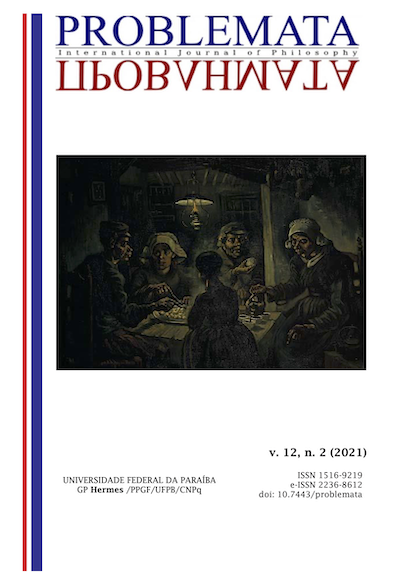THE METHOD FOR DISCOVERING JUSTICE IN PLATO:
INTERPRETATIVE CONTRASTS BETWEEN M. CORNFORD AND WILLIAM ALTMAN
DOI:
https://doi.org/10.7443/problemata.v12i2.58170Keywords:
Plato, Justice, MethodAbstract
This text discusses two antagonistic interpretations of the Platonic method for justice. It discusses whether there would be a methodological rupture, in the search for justice, carried out by Plato in relation to Socrates. Different interpretative perspectives of the text of The Republic and the consequent conflict of these views are analyzed, with the analysis of texts by the Platonic scholars Francis M. Cornford and William H. F. Altman. When confronting the two interpretative perspectives, the objective is to analyze what would be the best reading of the main Platonic dialogue, that interpretation that would come closest to the primary intention of the Greek master.
Downloads
References
ALTMAN, William H. F. Plato the teacher: the crisis of Republic. Lanham: Lexington Books, 2012.
CORNFORD, F. M. Plato's Commonwealth. In: The Anwritten Philosophy and Other Essays. Cambridge At The University Press. 1950.
ENGLER, M. R. Plato the Teacher: the crisis of Republic (William Altman) - resenha. Hypnos (PUCSP), v. 30, p. 139-146, 2013b. Disponível em https://www.academia.edu/9908505/Plato_the_teacher_William_Altman_Resenha. Acesso em 03/08/2020.
PLATÃO. A República. Trad. Maria H. R. Pereira. Lisboa: Fund. Calouste Gulbenkian, 2001.
Downloads
Published
Issue
Section
License
Copyright (c) 2021 Rosana Nascimento Mota Ferreira

This work is licensed under a Creative Commons Attribution 4.0 International License.
Authors who publish with this journal agree to the following terms:
- Authors retain copyright and grant the journal right of first publication with the work simultaneously licensed under a Creative Commons Attribution License that allows others to share the work with an acknowledgement of the work's authorship and initial publication in this journal.
- Authors are able to enter into separate, additional contractual arrangements for the non-exclusive distribution of the journal's published version of the work (e.g., post it to an institutional repository or publish it in a book), with an acknowledgement of its initial publication in this journal.
-
- Authors are permitted and encouraged to post their work online (e.g., in institutional repositories or on their website) prior to and during the submission process, as it can lead to productive exchanges, as well as earlier and greater citation of published work (See The Effect of Open Access).





